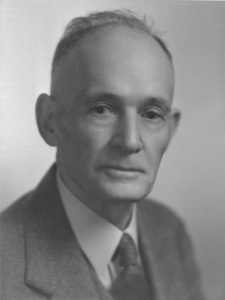
District: 3 (later became #4)
Hometown: Pawhuska, Oklahoma; Osage County
Birthplace: Georgetown, Indiana
Spouse: Ray K. Sykes
Children: Elwood B. Chappell; Florence Chappell Tupper; Ellen M. Chappell Binning; Evelyn Chappell Carlson
Chappell attended Gates Academy, Neligh, Nebraska, 1885—1887 , and Oklahoma Baptist University. He entered political life at the age of 21 when he was elected county assessor of Pierce County, Nebraska. He was admitted to the Bar in 1890. He began his practice of law in Lincoln, Nebraska. Chappell came to Oklahoma in 1902 as an attorney in Guthrie. In 1907 he was a member of the first legislature and Republican leader of the House. He was a Municipal Court Judge in Guthrie from 1909-1911. He also held office of County Assessor, Osage County, 1927-1928. He lived in Guthrie 1902-1922; Hominy, 1922-1927 and then Pawhuska.
He was elected to the Court of Criminal Appeals in 1928. At this time Chappell had held six elective offices and had never been defeated. Judge Chappell issued a famed opinion holding the statute unconstitutional which provided that escaped prisoners receive sentences up to twice the period for which they were serving at the time of escape.
After serving on the Court, Chappell became the President of the American Goat Association. In 1937, Chappell ran the largest goat farm in the state, which was located at NE 53rd and Kelly. In 1943, Chappell was sworn into the office of justice of the peace to fill the vacancy of W.G. Dunn. In 1944, as a Democrat, he sought re-election as justice of the peace and lost.
Chappell was an ordained Baptist minister and vice—president of the Baptist General Conference of Oklahoma. He was a member of the Downtown Baptist Church.